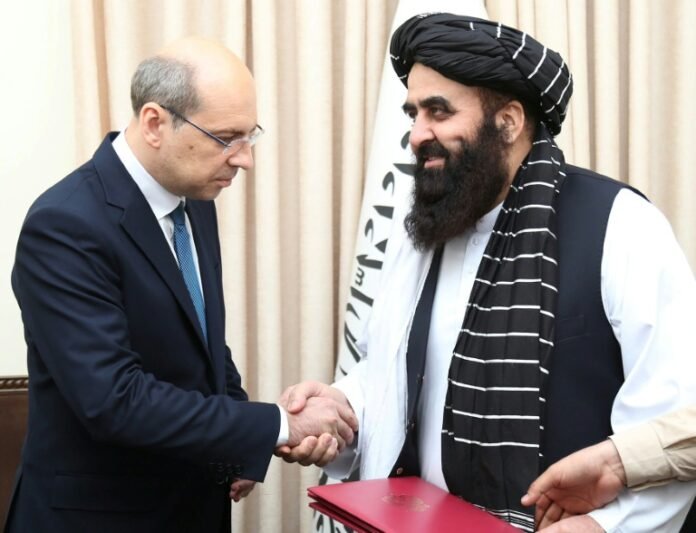On July 3, 2025, in Moscow, the Russian Federation officially recognized the Taliban
government of Afghanistan, becoming the first country in the world to formally
acknowledge the Islamic Emirate of Afghanistan. This development marks a major
milestone in international diplomacy and is expected to have significant implications for
Russia-Afghanistan relations and geopolitical dynamics across Central and South Asia.
The Taliban seized control of Afghanistan in August 2021, following the chaotic
withdrawal of U.S.-led NATO forces after two decades of war. Despite their effective
control over the country, no nation had granted the group formal diplomatic recognition,
primarily due to concerns regarding human rights violations, governance issues, and
links to terrorism. However, countries such as China, the United Arab Emirates,
Pakistan, and Uzbekistan had designated ambassadors to Kabul as a form of partial
diplomatic engagement.
On July 3, 2025, the Russian Foreign Ministry in Moscow announced the acceptance of
credentials from Gul Hassan Hassan, the Taliban-appointed ambassador to Moscow,
constituting full diplomatic recognition of the Taliban government. The Ministry stated,
“We believe that the act of official recognition of the government of the Islamic Emirate
of Afghanistan will give impetus to the development of productive bilateral cooperation
between our countries in various fields.” Afghan Foreign Minister Amir Khan Muttaqi
expressed appreciation, stating, “We value this courageous step taken by Russia, and,
God willing, it will serve as an example for others as well.” This development inaugurates
a new chapter in Russia-Afghanistan relations, focusing on enhanced cooperation in
counter-terrorism, economic development, and diplomatic normalization.
Russia’s recognition is motivated by several strategic considerations. In terms of
security, Moscow views the Taliban as a partner in regional stability, particularly in
combating ISIS-K, which was responsible for the March 2024 concert hall attack in
Moscow that killed nearly 150 people. The attack underscored the urgency of
strengthening counter-terrorism cooperation in the region.
Economically, Afghanistan’s geographic location and resource potential present
opportunities for Russian investment, especially in energy, agriculture, transportation,
and infrastructure. Since 2022, Afghanistan has imported Russian oil, gas, and wheat,
and this recognition is expected to further strengthen trade relations and development
initiatives.
On a geopolitical level, Russia’s decision enhances its influence in Central Asia,
challenging Western dominance and aligning Moscow more closely with other pragmatic
regional powers such as China and Iran.
Despite these developments, the Taliban government remains internationally criticized
for its policies regarding women’s rights, education, and freedom of expression. The
Taliban has banned girls’ education beyond the sixth grade and imposed severe
restrictions on women’s participation in public life and employment. These ongoing
human rights concerns continue to hinder broader international recognition, particularly
from Western countries, which maintain that formal diplomatic engagement should be
contingent on the Taliban’s implementation of governance reforms and respect for
human rights.
Experts analyzing the move highlight that Russia’s recognition is driven more by
realpolitik than ideological alignment. One analyst noted, “This is more about Moscow
asserting influence in a post-American regional order than endorsing the Taliban’s
domestic policies.” Another summarized the Kremlin’s approach as “gambling on
stability over democracy,” emphasizing Moscow’s prioritization of regional control,
terrorism prevention, and economic access over concerns about internal governance.
This reflects a growing global trend where strategic national interests and security
concerns increasingly guide foreign policy, often taking precedence over democratic or
humanitarian considerations.
In conclusion, Russia’s formal recognition of the Taliban government in Moscow signals
a pivotal shift in Afghanistan’s diplomatic status. This may prompt other regional powers
to reconsider their positions, especially those with vested security and economic
interests. Nonetheless, widespread international acceptance is likely to remain elusive
unless the Taliban undertakes meaningful reforms in governance and human rights. The
move not only reshapes Russia-Afghanistan relations but also exemplifies a broader
realignment in global diplomacy toward non-Western models of engagement.







